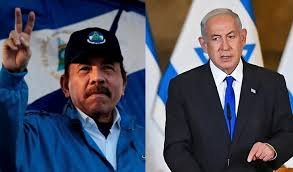Nicaragua Cuts Diplomatic Ties with Israel Amid Ongoing Conflict
Overview of the Diplomatic Split
In a significant geopolitical move, Nicaragua has severed its diplomatic relations with Israel, marking a decisive shift in its foreign policy amid the ongoing Israel-Palestine conflict. This announcement was made by Nicaraguan President Daniel Ortega during a recent press conference, where he expressed solidarity with Palestine. Ortega’s government condemned Israel’s actions in Gaza, calling them inhumane and a violation of international law. The decision underscores Nicaragua’s alignment with other Latin American nations that have similarly distanced themselves from Israel in light of the escalating violence.
Nicaragua’s Position on the Israel-Palestine Conflict
President Ortega’s stance reflects a growing trend among Latin American countries to support Palestine amid increasing tensions in the region. Nicaragua’s foreign policy has historically leaned toward anti-imperialist sentiments, with Ortega highlighting the need for justice for Palestinian people. This decision to cut diplomatic ties with Israel is part of a broader strategy to assert Nicaragua’s position on the global stage, aligning itself with nations that oppose what they view as oppressive actions by Israel against the Palestinian population.
Reactions from the International Community
The international response to Nicaragua’s decision has been mixed. While some nations and organizations praised the move as a courageous stand for Palestinian rights, others criticized it as an unproductive escalation in an already volatile situation. The cut in diplomatic ties could affect Nicaragua’s relationships with other countries in the region, potentially isolating it from nations that maintain a neutral or supportive stance toward Israel. This decision also raises questions about the future of Nicaragua’s foreign policy and its implications for regional stability in Central America.
Economic and Political Implications
The severing of ties with Israel may have economic repercussions for Nicaragua, which has had limited trade relations with the country. However, Ortega’s administration appears willing to sacrifice these relations to reinforce its ideological stance. The decision also has political implications, as it may influence Nicaragua’s alliances within the context of global politics, particularly in relation to countries that share similar views on the Israel-Palestine conflict.
Why This News is Important
Diplomatic Shifts in Global Politics
Nicaragua’s decision to cut diplomatic ties with Israel signifies a growing trend among Latin American nations to adopt a more pro-Palestinian stance in the face of ongoing violence and humanitarian crises. This shift highlights the changing dynamics in international relations, particularly in regions historically aligned with Western policies.
Humanitarian Concerns
The conflict between Israel and Palestine continues to evoke strong reactions globally, with humanitarian issues at its core. Nicaragua’s move emphasizes the need for international attention to the humanitarian crisis in Gaza and calls for renewed efforts towards a peaceful resolution.
Impact on Regional Alliances
As Nicaragua aligns itself with countries that support Palestine, the decision could influence its relationships within Central America and beyond. Understanding these shifts is crucial for analyzing the broader geopolitical landscape and regional stability.
Historical Context of Nicaragua’s Foreign Policy
Nicaragua has a history of aligning with leftist movements and governments that oppose U.S. influence in the region. Ortega’s administration has consistently emphasized anti-imperialist rhetoric, aligning itself with countries like Venezuela and Cuba. This context is vital in understanding the motivations behind Nicaragua’s recent diplomatic decisions.
Potential for Escalation
The severing of ties with Israel might contribute to escalating tensions in the region. As more countries take similar stances, the risk of increased geopolitical conflicts rises, making it essential for students to stay informed about these developments.
Historical Context
Nicaragua’s Foreign Policy Legacy
Nicaragua’s foreign policy has evolved significantly since the Sandinista revolution in 1979, which aimed to combat U.S. influence in Central America. Over the decades, Nicaragua has often positioned itself against perceived imperialism, forging alliances with countries that share similar ideologies. The historical context of Nicaragua’s foreign policy is marked by its support for liberation movements and a commitment to anti-colonialism.
The Israel-Palestine Conflict
The Israel-Palestine conflict has deep historical roots, with ongoing disputes over land, sovereignty, and human rights. Nicaragua’s recent decision reflects a broader discontent with Israel’s military actions and a growing solidarity with the Palestinian cause, which resonates with many Latin American nations.
Key Takeaways from “Nicaragua Cuts Diplomatic Ties with Israel”
| S.No | Key Takeaway |
|---|---|
| 1 | Nicaragua has severed diplomatic ties with Israel, reflecting a shift in its foreign policy. |
| 2 | President Ortega condemned Israel’s actions in Gaza, labeling them inhumane. |
| 3 | This decision aligns Nicaragua with other Latin American nations supporting Palestine. |
| 4 | The international response is mixed, with some praising the move and others criticizing it. |
| 5 | The severing of ties may have economic implications for Nicaragua but reinforces its ideological stance. |
Important FAQs for Students from this News
1. What prompted Nicaragua to cut diplomatic ties with Israel?
Nicaragua severed diplomatic relations with Israel in response to the ongoing violence in Gaza, condemning Israel’s actions as inhumane and a violation of international law.
2. How does Nicaragua’s decision impact its relationships with other countries?
Nicaragua’s stance aligns it with other Latin American nations supporting Palestine, potentially affecting its relationships with countries that maintain a neutral or supportive position towards Israel.
3. What are the historical influences on Nicaragua’s foreign policy?
Nicaragua’s foreign policy has historically leaned toward anti-imperialism and support for leftist movements, influenced by its Sandinista revolution in 1979.
4. How has the international community reacted to Nicaragua’s decision?
The international response has been mixed; some nations have praised Nicaragua for its solidarity with Palestine, while others have criticized the move as an unproductive escalation in an already volatile situation.
5. What are the potential economic implications of Nicaragua’s decision?
While the cut in diplomatic ties may affect limited trade relations with Israel, Nicaragua’s government appears willing to prioritize its ideological stance over economic considerations.

